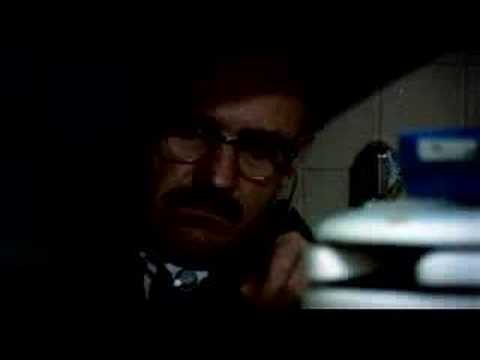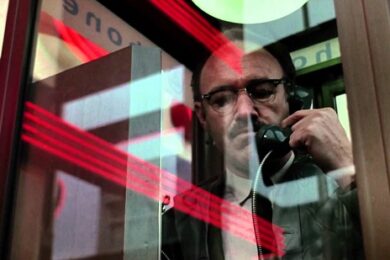Citizenfour, the Oscar-winning 2015 documentary directed by Laura Poitras, sees the whistleblower Edward Snowden revealing the chilling extent of the surveillance engaged in by state institutions like the NSA and GCHQ. In it he talks about the NSA’s PRISM and GCHQ’s TEMPORA programs, designed in such a way as to indiscriminately sweep the communications of entire populations, all done under the auspices of security. He speaks about the early days of the internet and the optimism that accompanied the technology, and of how this optimism has gradually been eroded to the point where we now find ourselves in a situation where “it’s become an expectation that we’re being watched” and “people self-police their own views online.”
Type ‘PRISM’ or ‘TEMPORA’ into a search engine and, according to Snowden, it will most likely be flagged up by the very institutions that run those programs, probably entailing a further exploration of your online habits. If it’s subsequently discovered that you’ve done such dubious things as, say, bought a book on the history of Anarchism via Amazon, signed an online petition against the Iraq War and made some anti-establishment jokes on Facebook, there’s every chance you’ll end up on a ‘watch list’. In the film it’s revealed that the NSA alone has 1.2 million Americans on this ‘watch list’. As Snowden puts it, “It’s not science fiction. This stuff is happening right now.”
Citizenfour is brilliant at conveying the level of paranoia (certainly justifiable in this instance) that accompanies Snowden’s revelations, as he and journalists bunker down in a hotel room in Hong Kong trying to get the NSA files and the story out into the public sphere. It exemplifies one of the ironies of functioning in this kind of atmosphere, namely that the sense of violation comes as much from believing you are under surveillance as actually being under surveillance. In fact, it’s precisely by creating this ‘all-knowing’ aura that powerful institutions have traditionally sought to maintain control over large populations.
Forty years before the release of Citizenfour, Francis Ford Coppola directed The Conversation. He only got the film made because of the unexpected success he’d had with The Godfather and the promise to direct its sequel, the production being sandwiched between the two. It focuses on the character of Harry Caul played by Gene Hackman, a bugging specialist trained in cutting edge security methods. Having worked for state institutions in New York during the radical upheavals of 1968 – the year, some would argue, that marked the end of Sixties idealism, what with the assassinations of Martin Luther King and Robert Kennedy, as well as the riots in Chicago – Caul is now based in San Francisco and working as a freelancer for private corporate clients.
The film opens with Caul recording a conversation between a young couple walking through Union Square. We see the methods by which this is done, in the use of such innovations as a shotgun microphone controlled by a ‘sniper’ on the roof of a building, undercover agents with hidden recording devices positioned near the couple and so on. Once the recording is over, Caul returns to what is essentially a recording studio in an old warehouse, and like a film director and sound editor, cuts and co-ordinates the various recordings to bring the conversation into focus. Things the couple say are continuously repeated throughout the movie, all the distortion and flutter gradually unscrambled and smoothed out, the audience decoding its meaning along with Caul himself, until the truth is finally revealed. To this extent, the film shares much with Antonioni’s Blow Up, as well as the traditional Hitchcockian thriller.
Many critics understandably see The Conversation as a commentary on the Nixon administration, in particular the Watergate scandal – the event for which Snowden’s revelations would seem to be the present-day equivalent – yet the film was already in production when the story of Nixon’s bugging operation broke, and Coppola had actually written the script for the film back in the mid-Sixties. Nevertheless, it was into this paranoid, post-Watergate world that the film was released, and it’s interesting to note that Harold Lipset, the technical consultant on the movie, would go on to provide expert information on bugging techniques for Senator Ervin’s committee assigned to investigate Watergate.
The media theorist, Marshall McLuhan – he of ‘the media is the message’ fame – said at the time that “the Watergate affair makes it quite plain that the entire planet has become a whispering gallery, with a large portion of mankind engaged in making its living by keeping the rest of mankind under surveillance.” Such a comment had the flavour of traditional Cold War paranoia at the time, yet forty years on, in Citizenfour we discover a vast new NSA construction being built in Utah, destined to house thousands of staff utilising software capable of making a billion intercepts on a daily basis.
Another feature of The Conversation that feels particularly prescient – and this is true of a lot of the paranoid thrillers from the 1970s – is the sense of a malign nexus between corporate and state interests, as if some nefarious sleight-of-hand had brought about a new stage in the evolution of the military-industrial complex. We see it most explicitly when Caul attends a surveillance convention in the film – the convention itself was real enough – and where we first encounter his rival in the trade, William Moran, “the guy who told Chrysler that Cadillac was getting rid of its fins.” It’s also here that we are introduced to innovations like CCTV, a product now so popular that the United Kingdom has over four million of them in public places.
Don DeLillo, a writer who in countless books has charted the shadow-world of post-war America, reflects on this relationship in Libra, where characters like the CIA agent Parmenter ‘…saw there was a natural kinship between business and intelligence work’ and ‘…could not always tell where the agency left off and the corporation began’. Another character in the book, Win Everett, talks about the long-term effects of all this surveillance. “I tell you what it means, these orbiting sensors that can hear us in our beds. It means the end to loyalty. The more complex the systems, the less conviction in the people. Conviction will be drained out of us. Devices will drain us, make us vague and pliant.”
It’s hard not to agree with this. After all, despite everything that’s been revealed over these past 40 years, despite WikiLeaks and Snowden’s revelations (and Citizenfour’s high-profile Oscar) people are not exactly rushing onto the streets to protest at what’s being done to their civil liberties. Part of this apathy stems from the virtual nature of all this surveillance, making it hard for people to believe in its reality. If a stranger physically entered your house and started opening your mail, or if you sat at your computer and saw windows and files opening and closing without you touching a key, maybe the scale of the intrusion might be brought home. But even then, many people make the argument that ‘I’ve got nothing to hide, so what’s the problem?’, a remarkably naive assertion based on the erroneous notion that those gathering and trafficking the information are benign organizations who have the best interests of the law-abiding citizen at heart, rather than institutions looking to assert political influence or make a profit.
Another argument holds that the reason for such apathy lies in the technology itself. We’re back here with Marshall McLuhan’s ‘the media is the message’ – not to mention Guy Debord’s ‘society of the spectacle’ and Jean Baudrillard’s concept of simulacra. Baudrillard, in reference to the ‘revolutionary’ events of 1968 claimed they could not survive their mediation, that in the process of being filmed and reported on, they were effectively turned into ‘performances’, neutralized into ‘signs’ and thus emptied of their radical content. We’re in danger of entering into a post-structuralist circle jerk here, but it’s enough to admit that most of us are perfectly content to watch various crises envelope the world via our TV and computer screens and do absolutely nothing about them – the intolerable merely becoming a state of daily banality.
What becomes clear in The Conversation is that, much as Harry Caul might attempt to distance himself from his own actions by concentrating on the technological processes of his job, he cannot completely escape his responsibility. This is the same point reached by Edward Snowden, a man who was, after all, an active part of the surveillance process until he found the considerable courage it took to stand in opposition to it.

There are also some stark truths to be faced about our own collusion. To clumsily paraphrase Oscar Wilde, there’s only one thing worse than being bugged and that’s not being bugged. Which is to say we want to be people who are worth watching or listening to. When it comes to our online habits, this means we are willing to surrender all kinds of intimate information about ourselves in order to get noticed, to be ‘liked’, to attract ‘followers’. There is a tacit acknowledgement of our inconsequentiality in all this, of the humdrum, routine existences most of us lead – the ‘applauseless life’ as Richard Ford puts it.
It’s why so many people are willing to buy into the dream sold by technology companies. Take a look at the evangelical reaction of Apple employees to product presentations by the late Steve Jobs, or the fake-gravitas and pseudo-meaning wrapped up in a sun-bleached Facebook advert. Here the future is one long multi-cultural, multi-ethnic party of connectivity, where we forge deep friendships and embark upon life-changing ‘journeys’, where we work – or better still, ‘create’ – from anywhere in the world at any time, all thanks to our smart phones and social networks. This is the world of Jay Gatsby’s green light, and ‘the orgiastic future that year by year recedes before us.’ Recedes because it is, after all, a dream and thus impossible to hold on to.
In The Conversation we’re very much on the flipside of all this techno-Utopianism. In this world and the world of Citizenfour, all technology has succeeded in doing is further atomizing and alienating us from one another. This is a world where we don’t work from anywhere anytime but everywhere, all the time, and where people don’t share information and ideas, but celebrity gossip and their own prejudices in hysterical online rants.
The reality lies somewhere between these two extremes, albeit with occasional oscillations to either end of the spectrum. On the one hand, we’re mostly aware of how much salesmanship goes into turning a lump of metal, plastic and glass into a fetish object, while on the other we’re not likely to find ourselves in Harry Caul’s position, succumbing to a level of paranoia that sees him destroying his entire apartment and all its contents in search of an elusive bug. Nevertheless, in the light of all the encroachments on our freedom that have taken place since 9/11, frequently done in the name of that freedom, it’s worth repeating Edward Snowden’s comment in Citizenfour as he prepares himself for exile from his family and his homeland. “We all have a stake in this,” he says. “This is our country.”




